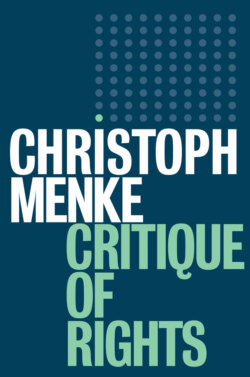Читать книгу Critique of Rights - Christoph Menke - Страница 12
From Athens to London
ОглавлениеAccording to Luhmann, the introduction of the modern category of rights “modifies the awareness of law” by breaking with the traditional idea of “right, or the just” (ius sive iustum). On this traditional view, law is “that which is justified by an objective order. Therefore, it is also interpreted as a derivative of iustum.”63 Luhmann explains this as follows:
The sanction available via law is only a supplementary apparatus for an already existing order. Ius-semantics adheres to these guidelines and therefore interprets ius as justice to be administered. As a result, justice, in concrete terms, is that in a position which is due to another. In this specific positional and social sense, it is relatio, mensura, commensuratio, aequalitas, adequatio.64
Traditional law defines relations of reciprocity between entitlements and obligations that are themselves defined by essentially different positions in a stratified social order. In it, “diverse contributions, for example, those of the guardian and of the ward, those of the prince and of his advisers, coalesce into a legal relationship.”65 Claims and rights are here contributions, determined by social positions, to a relationship that is reciprocal, and to this extent just. If, in contrast, legal claims in modern times are “defined as facultas, as capability, as formative power,”66 they are thereby released from such relations of reciprocal justice. The modern character of rights is unjust (according to the standard of traditional law). It has the character of a thoroughgoing de-moralization of law.
Luhmann describes this process by distinguishing two types of law: traditional moral law and modern law. Yet we can better understand the specific difference of the modern category of rights if we expand our view to include a third regime that carries out the transition between moral and modern law. In the history of philosophy, this occurs in Roman law. For Roman law indeed adopts the traditional moral code as ius sive iustum: “Justice is the constant and perpetual wish to render everyone his due [jus suum cuique].”67 This is not the whole story, however. If we follow the argument that Michel Villey developed in a series of essays, it becomes clear instead that a de-moralization of law already begins in Roman law itself. This does not at all mean that Roman law should be understood as a prototype of modern law. Contrary to a (specifically German) tradition of legal criticism from the early Hegel to Heidegger, which plays off Athens against Rome, and thereby combines law in Rome with law in Western European modernity into a complex whole, Villey’s work aims to clarify the radical difference between Roman and modern law – which for him, including the idea of human rights,68 seemed to be a decline in the Roman awareness of law. The Roman de-moralization of law does not anticipate the modern conception of rights, but, conversely, first allows us to recognize them in their radical innovation.
To demonstrate this, in what follows I will develop a sharply stylized outline of three regimes of private law, which can be situated in three distinctive locales in the history of philosophy: Athens, Rome, and London. In doing so, I am concerned not with historical accuracy (I am therefore not claiming that this is how it was in these three places at a certain time), but with the conceptual distinction of three models of private law. I draw this distinction with one goal in mind, namely to allow the specific feature of that legal system which has become central in the modern category of rights to emerge. I am therefore concerned with the upheaval in the form of law, the upheaval in its normativity and rule, which the modern character of rights brings about and expresses. This character provides a completely new answer to two questions: how (and what) apportions or distributes law? And how (or to what extent) does law rule and is law enforced? The modern character of rights revolutionizes how law is distributed and rules: the modern right of rights enables self-preservation (chapter 2) and allows choice (chapter 3).
